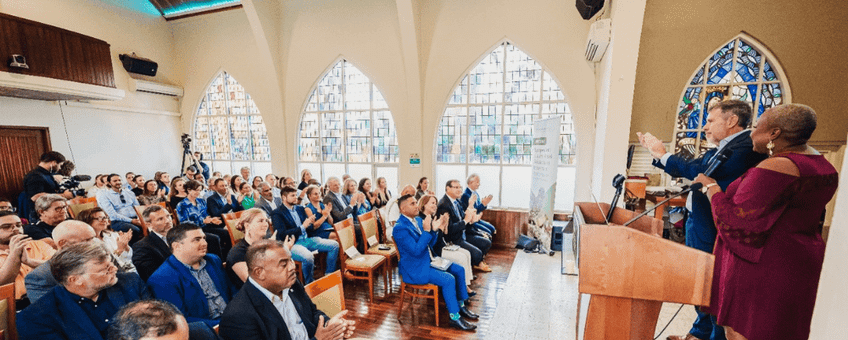
NL 2120: Pioneering Nature-Based Solutions for a resilient and aesthetic future
Dutch Caribbean Nature Alliance (DCNA)Jones-Walters introduced the NL 2120 initiative, a visionary approach aimed at transforming the Netherlands by 2120. This initiative envisions a landscape already dealing with the consequences of climate change, such as increased land under water, and emphasizes the need to integrate Nature-Based Solutions to mitigate these impacts. An example presented was the use of an open mud flat versus a concrete wall to control flood water. Although both will help divert water, only the mud flat provides aesthetic value (increased nature area) while also delivering ecosystem services, sequestering carbon, and contributing to biodiversity conservation.
The success of the NL 2120 initiative lies in its ability to capture the popular imagination. By engaging with stakeholders from various sectors, Jones-Walters and his team have worked to generate public awareness and interest. The initiative has already received substantial media coverage, emphasizing the importance of Nature-Based Solutions at the highest levels, such as the G7’s commitment (pdf; 126 KB) to becoming nature-positive by 2030.

Scaling up: the role of partnerships
Jones-Walters stressed that partnerships are essential for addressing complex, interconnected challenges. Nature-Based Solutions require collaboration across sectors and stakeholders. By working together, stakeholders can tap into resources, share knowledge, and develop flexible, resilient solutions.
Keys to Success
Jones-Walters outlined key lessons learned from the NL 2120 initiative and subsequent projects:
- Imagine a big idea: long-term, visionary thinking is crucial for tackling environmental challenges.
- Take a holistic approach: Nature-Based Solutions should be integrated across sectors, with the environment sector as a stakeholder rather than a standalone entity.
- Effective communication: tailor communication strategies to different stakeholders, ensuring that the message resonates with diverse audiences, including ministers, business leaders, and the public.
- Adaptability and collaboration: remain flexible, open to change, and willing to collaborate with other sectors to achieve common goals.
- Invest in partnerships: building and sustaining partnerships require time, energy, and a new skill set. Develop the ability to moderate and facilitate discussions involving diverse stakeholders.
- Collective imagination: harness the power of collective imagination for innovative and sustainable solutions.
Conclusion: the cost of inaction
Lawrence Jones-Walters concluded by urging stakeholders to consider the cost of doing nothing. As Dutch islands present their unique offerings, it is imperative to act now to sustain these assets for future generations. The investment made in preserving the environment and the benefits of taking action far outweigh the consequences of inaction. In the face of environmental challenges, inclusive partnerships and nature-based solutions offer a viable and sustainable path to a better future.
Presentation of Lawrence Jones-Walters (Source: DCNA)
The full symposium (Source: DCNA)
DCNA
DCNA extends its gratitude towards the sponsors; Milton Harms Fonds in collaboration with Prins Bernhard Cultuurfonds Caribisch Gebied, Aruba Tourism Authority, VNO Ministerie van Binnenlandse Zaken en Koninkrijksrelaties, Grant Thornton, Dutch Postcode Lottery, and Pelican Adventure, for contributing to the symposium and supporting an environment of collaboration and progress, exemplifying the power of partnership in driving positive ecological change.
Learn more about the DCNA by following the DCNA on social media via Facebook (Dutch Caribbean Nature Alliance), Instagram (DCNAnature), LinkedIn (Dutch Caribbean Nature Alliance), and visiting their website.
Text, photos en films: DCNA
